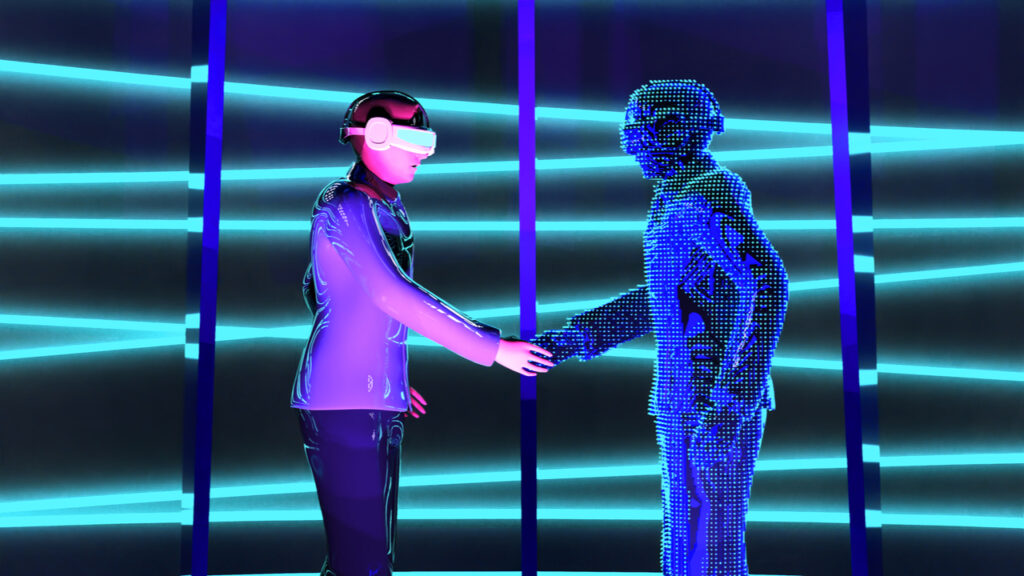Over the past few months, the idea of Metaverse has become more and more well-known, and commercial groups and individuals are now more interested than ever in its potential applications. But few of us would be familiar with the metaverse’s underlying technologies.
Let’s examine the fundamental technologies that underpin the metaverse in more detail in this blog, as well as some predicted advancements. By establishing agreements to sell digital art pieces, virtual properties, and other items, a select few fortunate individuals have already succeeded in making significant sums of money. Unsurprisingly, a lot of experts are showing a lot of interest in this area and say that Blockchain and Metaverse have the potential to completely transform the Internet as we know it.

Why It’s Crucial to Understand Metaverse Technologies?
The immersive setting of the metaverse isn’t simply for industries that cater to customers, like e-commerce or education. Instead, the Metaverse can be helpful to businesses across a variety of industries, with use cases ranging from conducting product and service demos to communicating with remote coworkers to training medical doctors.
Therefore, it also benefits brands to be aware of the many sides of the Metaverse, especially the business applications it offers in their sector so that they are constantly in alert mode. Understanding the technical aspect of the Metaverse is crucial if your company intends to pursue or enter it.
How is Metaverse Related to Blockchain
So what does the idea of the Metaverse relate to the concept of blockchain? Today, a number of blockchain-based platforms use cryptocurrencies and so-called non-fungible tokens, establishing an ecosystem for the creation, ownership, and monetization of decentralized digital assets. The idea of the Metaverse is incomplete without blockchain because of all the problems with centralized data storage. Because blockchain is a decentralized digital source that can operate worldwide, it fundamentally differs from the capabilities of the old internet, which naturally takes the shape of websites and applications. Any digital place can be accessed through the blockchain-based metaverse without the influence of a centralized authority.

Why Blockchain is a Crucial Piece of Metaverse Technology
The fundamental operational tenets of the ecosystem have already been established, even though there is still no singular concept of the Metaverse, and the concept itself is only partially realized in initiatives like Google Blocks and Facebook Horizon.
The two fundamental parts of any metaverse are the hardware and the software. The hardware enables comfortable user interaction with virtual or augmented reality by including all common controller types. When discussing software, we’re referring to a user-accessible digital environment.
Many in the sector have come to the conclusion that software can be based on Blockchain Technology, which stands for a secure decentralized database where independent nodes can communicate in a single, constantly updated network. Once you take a closer look at Blockchain technology, it becomes pretty clear that it can satisfy the needs of the Metaverse.
Below is a list of them:
Security:
The exabyte-scale data storage of the metaverse presents concerns about secure transmission, synchronization, and storage. In this view, the decentralization of data processing and storage nodes makes blockchain technology extremely pertinent.
Trust:
Blockchain requires the existence of tokens, which are safe storage units capable of conveying things like encrypted personal data, virtual content, and authorization keys. Because sensitive data won’t be accessible to outside parties, the metaverse blockchain fosters greater user confidence in the ecosystem.
Decentralization:
Everyone involved in the metaverse must view the same virtual environment for it to operate as intended. Numerous separate nodes can synchronize thanks to a decentralized ecosystem built on Blockchain Technology.
A smart contract:
These allow for the efficient regulation of social, economic, and other relationships amongst ecosystem actors within the metaverse. Smart contacts also provide you the opportunity to create and put into practice the fundamental guidelines for the metaverse’s governance.
Interoperability:
Blockchain enables the unrestricted combined operation and interoperability of many systems and interfaces. This is particularly important in terms of NFT valuation and turnover.
Money Links:
Being an essential component of the blockchain, cryptocurrency can function as a functional equivalent of conventional money. Additionally, using cryptocurrency in the Metaverse is a reliable method for performing mutual settlements. It is evident that there are many problems associated with centralized ecosystems when it comes to the development and operation of the virtual world. These can include malware, hacks, and even centralized metaverse operation decision-making. But these dangers are reduced by Blockchain Technology, which also enables the creation of a reliable virtual ecosystem.
Yes. Since the technology allows users to safeguard their digital assets in virtual reality, Blockchain is a crucial component of the metaverse. Actual blockchain initiatives like “Axie.
A Breakdown of Blockchain Applications in the Metaverse
Infinity” and “The Sandbox” serve to highlight this fact. The metaverse plays a role in both. Using the metaverse cryptocurrency, users can produce and exchange NFTs as digital assets, as well as gain from the local economy.
Without a domestic economy, the Metaverse cannot exist. This contributes to the argument for why the incorporation of metaverse crypto is unavoidable. Through the use of blockchain, this metaverse market is made transparent and productive economically. The use of trustworthy algorithms for swapping out physical assets for digital ones is crucial while developing virtual reality. In this regard, the metaverse blockchain is essentially the only technical solution that could at the moment offer the necessary degree of trust in financial transactions within the Metaverse.
This is why Blockchain technology has emerged as a vital tool for precisely identifying any virtual asset today without the assistance of a centralized organization. The key to creating a fully developed metaverse is ensuring that every member of the ecosystem has the ability to recognize a digital asset and trace its own according to the decentralization axiom.

Summing Up
Although there are many different interpretations of the metaverse notion, practically all experts concur that it is a niche with enormous potential. It has the ability to generate excellent returns for investors. The fundamental components of the metaverse, such as digital proof of ownership, money transfer, governance, accessibility, and interoperability, all plainly require blockchain as a necessary technology. Choosing a project that people will like and that will draw in new participants is the main problem because doing so will raise the project’s capitalization and the worth of any digital assets linked to a certain metaverse.
The creation of virtual property is just one of the many methods to make money in the metaverse, in addition to purchasing and selling collections of Metaverse NFTs. Metappfactory is a Metaverse development company that helps you with the detailed process of the Metaverse along with Blockchain technology that will boost your business.






